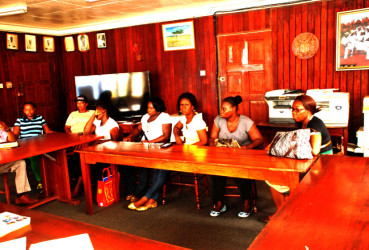Seven of the lowest paid public servants, most of them relatively young women who are heads of their households, spoke with Stabroek Business last week, seeking a way to make their case for their salaries to be lifted to at least the minimum wage level.
The women, who earn less than the equivalent of US$90 a month, spoke about the cost of living, including those costs associated with raising their children and managing their homes.
June Yansen one of the older, more experienced of the group, marks 20 years as a public servant sometime this year. She recalls that when she started the job in 1996, the salary was $2,000 per fortnight.

Collectively, the public servants who are officially titled sweeper/cleaners (a title that many of them resent and one which the Guyana Public Service Union has been seeking to have changed) believe that over the years they have been disregarded and abused.
In December 2013 the then cabinet secretary, Dr Roger Luncheon, had announced that government had decided that schools’ sweeper/cleaners would be paid under what was, at the time, a new minimum wage order and that other issues including uneven remuneration and late payment practices would be addressed. Little if anything has changed and those with whom this newspaper spoke last week say that the breaches and abuses have, since then, continued unabated.
The list is as long as a proverbial arm. Perhaps the most interesting anomaly is that while sweeper/cleaners are designated “contractors” they are not allowed to negotiate their salaries. This newspaper saw contracts and other documents which stated that some sweeper/cleaners are being paid a salary of $17,996 monthly. More than that there is no provision for vacation leave, a meal break nor is there any gratuity or pension entitlement.
In their discourse with Stabroek Business the women seemed less preoccupied with entitlements and minimum wage issues and more about their lives, their future and their families. They were concerned about how they could regularize their NIS contributions to ensure some measure of financial cover in the case of a medical emergency; how to sustain relatively modest but still demanding mortgage payments on their meagre salaries; how to afford the demanding costs of putting their children through school, free tuition at state schools notwithstanding; how to afford to keep their children properly nourished and how to keep themselves going amidst that labyrinth of challenges. It soon became clear that this was less of a formal negotiating issue and more of an urgent humanitarian appeal. The women are looking to government for a response that reflects a sensitivity to their plight.
The women talked about the nature of their jobs. Thankless is the word that comes to mind. A sweeper/cleaner’s duties are ill-defined and can range from rendering (several times a day) sanitary blocks used all day by hundreds of children to fetching buckets of water over distances in circumstances where the water supply regime on schools’ premises are less than reliable. Joylyn Jacobs, a sweeper/cleaner at Tuschen Nursery School says she sometimes fetches up to 20 buckets of water a day.
The group believes that the President is not unfamiliar with their plight. This newspaper was shown a detailed letter setting out the issues affecting sweeper/cleaners written by the GPSU and copied to the President. It covered issues ranging from the minimum wage concerns to longer term welfare issues like gratuity and pensions. Understandably, the protracted nature of their wait for a measure of relief has made them more than a trifle impatient. They want to shift the goalposts to move the negotiations to an interpersonal plain. The eldest of the group, Yansen, is the bluntest. “We want a heart-to-heart with him [the President],” she says.





